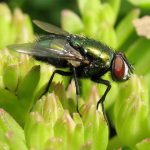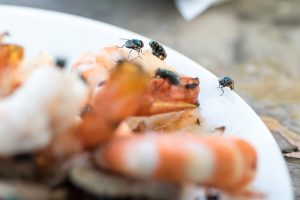
Flies in Melbourne
Flies are a constant pest, problematical in Melbourne and throughout Australia. They are not only a nuisance, they also carry various diseases that can be dangerous to humans, pets and livestock. The list of infections they can cause is long!
Some flies just buzz around your face and land on your food, while others will bite. Regardless of their differences they have one thing in common, they are annoying! A few more flies than normal in your home or your business premises, might not mean there is an infestation, but it should serve as a warning sign that a problem could be brewing.
As commercial pest control professionals, EPC – Enviro Pest Control have a wealth of experience in controlling flies and can help you rid the flies from your premises quickly. If you want a professional quote to have flies evicted or for IPM (Integrated Pest Management) plan, including the prevention of flies, contact EPC – Enviro Pest Control now. Hovering flies are not only an annoyance to customers but can also be viewed as unhygienic and cause embarrassment for food processing establishments such as cafes and restaurants.
Fly Disease and Contamination
More than just a dirty nuisance, flies are known carriers of a wide variety of pathogens that can be passed to humans causing diseases such as:
- Typhoid
- Conjunctivitis
- Dysentery
- March Fly bites can cause serious allergic reactions in some people
- Diarrhoea….the list is extensive.
They constantly excrete faeces and also vomit partially digested food, contaminating surfaces and food where-ever they land, and this leads to further disease risks.
The most common fly species encountered in Melbourne are:
- House Flies (Musca Domestica)
- Approx. 6-12 mm long
- Accounts for around 90% of all flies in human habitations
- 2 different species; the common housefly is predominately grey whilst the lesser housefly is grey with an extensive yellow patch at the base of the abdomen
- Eggs are laid in batches of up to 150 and hatch in 8-75 hours
- Attracted to all types of food and waste
- At night they prefer to roost near food sources approx. 4-15 feet off the ground
- Flight range of at least 8 km
- Drain Flies / Fermentation Flies (Psychodidae)
- Approx.2 mm long
- Greyish tan in colour
- Females can lay up to 500 eggs
- Attracted to fermenting or rotting vegetative matter
- A common nuisance pest in restaurants, supermarkets, fruiterers, canneries, homes and other locations that may attract these insects with fermenting or rotting vegetative matter
- Abdomen tends to hang down in flight
- Tend to hover
- Blow Flies (Calliphoridae)
- Typically blue, black or green with a metallic sheen
- Can travel for miles in search of perfect egg laying site and will stay close to that site laying multiple batches of eggs
- Can lay live larvae
- Highly active indoors
- Fruit Flies (Drosophila)
- Approx. 2-10 mm long depending on species
- There are more than 150 species of native fruit fly in Australia but most of these do not attack commercial crops
- Eggs are laid close to the surface inside the fruit with small discoloured patches developing as a result of the stings
- Are also attracted to fermenting residues often found in pubs and bars
- After hatching from the eggs, the larvae (maggots) tunnel deep into the fruit while feeding causing considerable damage inside the fruit. Affected fruit then begins to rot and often falls prematurely from the plant
- Tend to hover
- Bush Flies (Musca vetustissima)
- Approx. 2-6 mm long
- Similar appearance to housefly but smaller
- Attracted to saliva, sweat and tears of large animals and humans, sometimes leading to eye infections
- Lifecycle 3-5 weeks
- March Flies / Horse Flies (Tabanidae)
- Approx. 6-25 mm long
- Dark brown to black in colour
- Females commonly bite humans and animals
- Bites can be very painful
- Females of most March flies require a blood meal to develop their eggs
- Lifecycle from egg to adult can take months or years depending on the species and soil temperature
- Eggs are laid in masses from 100-1000 near water or wet ground
- March flies breed in places such as damp soil, rotting vegetation, sand and rot holes in trees
- Cluster Flies / Grass Flies (Pollenia rudis)
- Approx. 6-10 mm long
- Dark greyish olive in colour
- Lays eggs in soil with larva feeding on worms
- Most commonly found in quiet areas such as attics and wall voids
- Sluggish in flight
- Flesh Flies (Sarcophagidae)
- Approx. 6-15 mm long
- Grey colour with 3 large stipes along thorax and darker spotted patches on abdomen
- Attracted to decaying wastes, excrement and human foods
- Lacewing Flies (Chrysoperla carnea)
- Approx. 12-20 mm long
- Pale green colour with long antennae
- Large transparent wings
Breeding and Life Cycle of Flies
Life cycles of flies have four main stages; Adults>eggs>larvae>pupae. The length of life cycle spans vary according to the species, the average house cycle is about 30 days but others can live to around 60 days. During a fly’s lifetime a female will lay between 400-600 eggs.
The most common flies EPC – Enviro Pest Control find in homes and businesses are House flies, Drain flies, Blow flies and Fruit flies. (‘Drain flies’ or ‘fermentation flies’ are accepted coverall names for vinegar fly, phorid fly and moth fly, -no one fly is called a drain or fermentation fly).
How to get rid of Flies?
The first important step to help get rid of flies is to identify which breed you are dealing  with. EPC – Enviro Pest Control will determine their nesting habits and life-cycle. Breaking the life cycle is important, so both active flies and their larvae need to be targeted.
with. EPC – Enviro Pest Control will determine their nesting habits and life-cycle. Breaking the life cycle is important, so both active flies and their larvae need to be targeted.
In commercial situations, chemicals or products such as a Lumina LED electric fly killer could be installed to prevent flies from returning. Electric fly killer units are ideal for the commercial kitchen setting as they attract flies and other flying pests, killing them and catching their discarded remains discreetly.
EPC utilise Integrated Pest Management practices and can advise you on the range of control methods best suited to your situation.
Deterring Flies in Melbourne
We have all heard the saying, ‘Prevention is better than the cure.’ This applies to pests too. Here are some ways to limit the chance of a fly infestation occurring.
- Keep your door shut and install fly screens on windows and doors.
- Sanitise and keep food surfaces clean
- Seal rubbish bins
- Limit the presence of stagnant water
- Ensure drains are kept clean and flowing
- Clean up after pets or animals
Control techniques vary from site to site and may include setting traps, installing electric grids, chemical spray treatments and misting.
Finding the root cause of a fly infestation is an integral part of any pest management service. Fly breeding sites can be tricky to locate, however, EPC – Enviro Pest Control are licenced, commercial pest controllers and all EPC technicians are trained to locate, identify, interrupt and eliminate any pest causing you problems.
EPC’s Fun facts about Flies
- Flies can see behind themselves (due to their compound eyes)
- March flies are attracted to dark blue
- House flies taste with the feet. Their taste receptors are located on their lower leg and foot
- Nearly every time a House Fly lands, it defecates
- Fruit flies can live for several days without their wings, or their heads (but not both)!
Why Hire EPC – Enviro Pest Control for fly problems?
If you have a business or live in Melbourne flies can be more than just a nuisance, spreading disease-causing germs by crawling on food and other surfaces. EPC can identify the flies and the reasons behind the infestation to safeguard you from future infestations.
- We use chemicals that are HACCP compliant
- EPC staff are Trained Specialists and are very experienced at getting rid of flies and we understand the importance of a fast, efficient solution
- We arrive on time
- EPC staff are discreet, friendly and professionally presented
- Fairly priced service with advice to help prevent flies coming back
- EPC pest control services including fly treatments are effective
If you need to speak to a professional about Fly Treatments in Melbourne, call 03 9988 5066 now.
